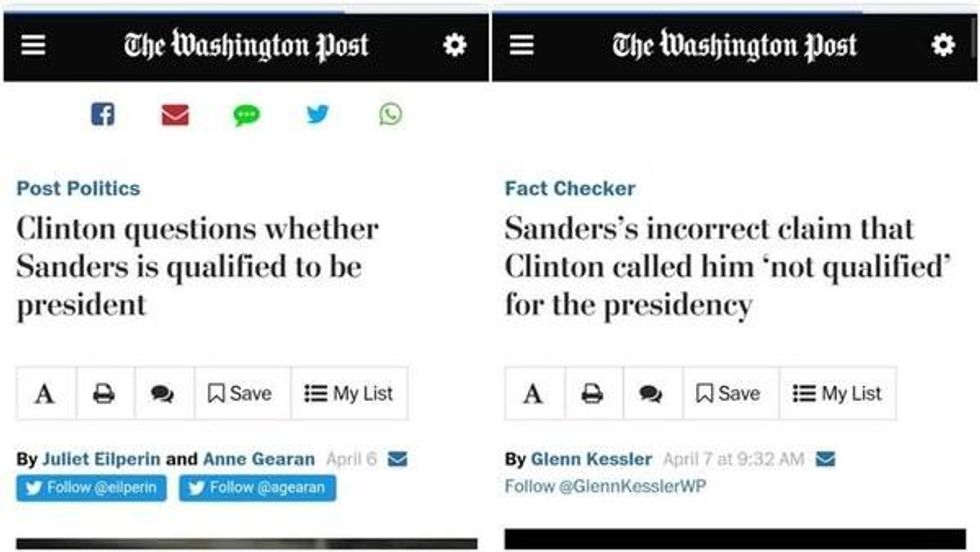On Tuesday, April 5, Bernie Sanders won the Wisconsin Democratic primary by double digits, and his victory speech ran for half an hour on CNN, a rare media moment when he was able to repeat the issues that have resonated with many Democratic primary voters.
After the Wisconsin loss, the Hillary Clinton campaign went into high gear, sending emails out announcing a new strategy of going negative. The next day, CNN (4/6/16) ran a piece by senior Washington correspondent Jeff Zeleny that began, "Hillary Clinton's campaign is taking new steps to try and disqualify Bernie Sanders in the eyes of Democratic voters." The story laid out Clinton's new "three-part strategy" with regard to Sanders: "Disqualify him, defeat him and unify the party later."
Political strategists know well that attacks can backfire, especially for candidates with high negatives such as Hillary Clinton. Accordingly, the Clinton campaign attacked Sanders through a common political maneuver: They used surrogates.
CNN's Zeleny reported:
A Clinton campaign fundraising appeal after the Wisconsin primary offered a glimpse into the new approach. The campaign's deputy communications director, Christina Reynolds, argued that Sanders is unqualified, sending a full transcript of a New York Daily News editorial board interview of Sanders. [Emphasis added.]
"We've said for a long time that this primary is about who's really going to be able to get things done. And from reading this interview, you get the impression Senator Sanders hasn't thought very much about that," Reynolds wrote. "In fact, even on his signature issue of breaking up the banks, he's unable to answer basic questions about how he'd go about doing it, and even seems uncertain whether a president does or doesn't already have that authority under existing law."
Though as FAIR (4/7/16) pointed out, the banking issue was a red herring. ("When asked how he would break up the big banks, Sanders said he would leave that up to the banks," economist Dean Baker wrote. "That's exactly the right answer.") But by Wednesday, MSNBC's Morning Joe (4/6/16) had already picked up the Clinton campaign's talking points. Host Joe Scarborough repeatedly tried to get Clinton herself to weigh in on whether Sanders was "unqualified" to be president. Instead of answering yes or no, she reiterated the campaign's carefully massaged strategy: "I think he hadn't done his homework, and he'd been talking for more than a year about doing things that he obviously hadn't really studied or understood, and that does raise a lot of questions."
(As Salon--4/8/16--pointed out, "question" is what Donald Trump did in 2012 regarding Barack Obama's birth certificate: "I don't consider myself birther or not birther, but there are some major questions here.")
The Washington Post (4/6/16) jumped in with a story headlined "Clinton Questions Whether Sanders Is Qualified to Be President." Though it parrots the Clinton campaign's talking points against Sanders, it attributed them to anonymous "critics" rather than to the campaign:
Clinton's comments follow a New York Daily News interview with Sanders that critics say revealed his inability to explain specifically how he would accomplish goals such as breaking up the biggest banks. [Emphasis added]
On Wednesday night, Sanders responded to the charges at a rally at Temple University, where he suggested Clinton was getting a little nervous. "And she has been saying lately that she thinks that I am, quote unquote, not qualified to be president." He went on to use the phrase as a rhetorical devise to criticize her policy record:
I don't believe that she is qualified if she is, through her Super PAC, taking tens of millions of dollars in special interest funds. I don't think that you are qualified if you get $15 million from Wall Street through your Super PAC. I don't think you are qualified if you have voted for the disastrous war in Iraq. I don't think you are qualified if you've supported virtually every disastrous trade agreement, which has cost us millions of decent-paying jobs.
The next move revealed the sophisticated media-handling of Clinton campaign strategists. Clinton operatives Christina Reynolds and Brian Fallon went on the offensive with, as Salon (4/8/16) put it, "sanctimonious incredulity," saying, "This is a ridiculous and irresponsible attack for someone to make." They complained that Clinton herself had never said such a thing, yet Sanders opened his comments with "quote, unquote."
And that's when the media storm hit. In the face of Clinton denials, media opened with Bernie Sanders going negative:
- NBC (4/7/16): "Bernie Sanders: Hillary Clinton Not 'Qualified' to Be President. The gloves are truly off between Bernie Sanders and Hillary Clinton. Less than 24 hours after Sanders' big win in Wisconsin, the senator from Vermont hammered Clinton for not being "qualified" to be president."
- NPR (All Things Considered, 4/7/16): "The Democratic presidential race has turned negative. Bernie Sanders now says Hillary Clinton isn't qualified to be president."
- Huffington Post (4/7/16): "Sanders' criticisms of Clinton focused on her policy positions, but to many of her supporters they came off as a personal insult.... Especially for many older supporters, they have heard throughout their lives that they're not as qualified as their male counterparts, and they relate personally to the struggles Clinton has faced."
- Paul Krugman (New York Times, 4/8/16): "The way Mr. Sanders is now campaigning raises serious character and values issues.... There was Wednesday's rant about how Mrs. Clinton is not 'qualified' to be president.... Is Mr. Sanders positioning himself to join the 'Bernie or bust' crowd, walking away if he can't pull off an extraordinary upset, and possibly helping put Donald Trump or Ted Cruz in the White House?"
The 'Factcheckers' Step In
By late Thursday afternoon, the website PolitiFact (4/7/16) evaluated Sanders' claim, asking and answering, "Did Hillary Clinton Say Bernie Sanders 'Not Qualified' to Be President? Not Directly." Sanders' claim was "mostly false," it found, citing Morning Joe, where Clinton only "questioned" his qualifications. When the Sanders campaign pointed to the CNN report saying that the Clinton campaign would "disqualify him, defeat him and unify the party later," PolitiFact retorted that the CNN article says "Clinton spokeswoman Christina Reynolds argued that Sanders is unqualified," not Clinton.
Even more curious was the Washington Post's (4/7/16) review of Sanders' claim in a piece titled "Sanders' Incorrect Claim That Clinton Called Him 'Not Qualified' for the Presidency." The Post gave Sanders three-out-of-four pinocchios for dishonesty, saying: "Sanders is putting words in Clinton's mouth. She never said 'quote unquote' that he was not qualified to be president.... He can't slam her for words she did not say."
The Post gave itself no pinocchios for headlining its own article the day before, "Clinton Questions Whether Sanders Is Qualified to Be President." It offered instead, "The art of headline writing is an imperfect art." Not only doesn't the Post hold Clinton responsible for her campaign's negative attacks, it treats her use of surrogates to make negative attacks as a positive, saying "she diplomatically went out of her way to avoid saying" that Sanders was unqualified.
In the face of Sanders' responding in kind, Clinton retreated by way of a similarly disingenuous comment she made to reporters outside Yankee stadium on Thursday. CBS (4/7/16) and other media reported that Clinton laughed off the attack when reporters asked her to react to Sanders: "Well, it's kind of a silly thing to say." She added, "I don't know why he's saying that. But I will take Bernie Sanders over Donald Trump or Ted Cruz any time, so let's keep our eye on what's really at stake in this election."
As Clinton backed off from the "disqualify" strategy, Sanders backed off as well, telling the Today show (4/8/16), "I respect Hillary Clinton, we were colleagues in the Senate, and on her worst day she would be an infinitely better president than either of the Republican candidates." He acknowledged to Charlie Rose (CBS Evening News, 4/7/16) that he was responding to the Clinton camp's declarations that "they're going to go much more negative on us."
But in the aftermath of the Wisconsin win, the media frame was not about Sanders' momentum, Clinton's connection to the Panamanian tax haven or, as US Uncut (4/8/16) reported, three major policy wins for Bernie Sanders, but how Sanders had gone negative and was untruthful. It occupied the news cycle for days, knocking out a barrage of bad press that was hobbling her in the run-up to the New York primary. With a lot of help from media friends, the Clinton people rewrote the news.




